Latest News
2025.12.15
News | Taiwan Blood Services Foundation ESG
- News
- Latest News
- Cultural Shift in Blood Donation at National Taiwan University: Inheriting the Spirit of Service, Igniting Student Passion
Back to List
Cultural Shift in Blood Donation at National Taiwan University: Inheriting the Spirit of Service, Igniting Student Passion
Latest News
2025.04.28
For many, blood donation may be their first encounter with public welfare, but for the faculty and students of National Taiwan University (NTU), it has gradually become a part of daily life.
In 1974 (Minguo Year 63), when the Taipei Blood Center was newly established to promote the concept of unpaid blood donation, a group of enthusiastic NTU faculty and students organized the first on-campus blood drive in January of the following year, held at the Student Activity Center. In 1988 (Minguo Year 77), the bloodmobile “NTU號” was stationed at the entrance on Xinsheng South Road, remaining there until 2016 (Minguo Year 105), when it was relocated to accommodate the city’s “2016 Design Capital Project.” Amid declining donation rates among young people and recurring blood shortages, once the Blood Center expressed renewed need, NTU’s passionate faculty and staff stepped forward again—inviting the bloodmobile back onto campus, and in the 2024 academic year (Minguo Year 113) achieving a total of 1,557 bags donated, earning recognition from the Ministry of Education.
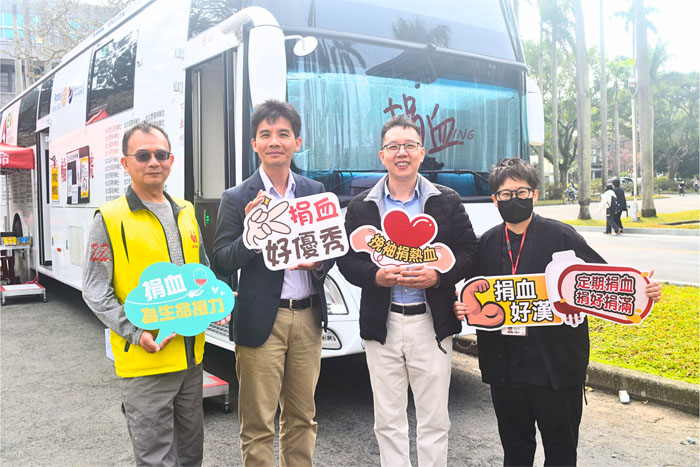
Dean of Student Affairs Prof. Chu Shih-wei (left 2) and Health Center physician Dr. Chi An-hsuan (left 3) tirelessly promote the cause of blood donation.
Blood Donation Is More Than an Event—it’s About Living Well
“We kept asking ourselves, ‘What do we really want to give our students?’” said Prof. Chu Shih-wei, who took office as NTU’s Dean of Student Affairs two years ago. He reflected on what could create lasting impact and value for students, distilling his observations over two months into two guiding principles: “Live Well” and “Gratitude in Helping Others.” The first urges students to care for themselves; the second, to give back to society with gratitude. These maxims now appear prominently on the Student Affairs Office website, and three calligraphic works reading “Sleep Well,” “Eat Well,” and “Live Well,” gifted by students, hang in his office as daily reminders.
Are NTU students inherently more responsible or mission-driven than others? “Everyone has a responsibility to society—not just NTU students,” Prof. Chu replied. “But I believe they will become influential leaders; if they learn to give back with gratitude, that will benefit society as a whole.”
He explains that the foundation for helping others is living well, and only with physical and mental health can one donate blood and do good deeds—it’s a virtuous cycle. “Blood donation is a way to help others while enriching your own life, because it’s rooted in altruism.” Reflecting on his own thirty years of teaching and learning at NTU, he noted that blood donation has become part of his life; his wife donates as well, and recently received a commendation for donating twenty units.
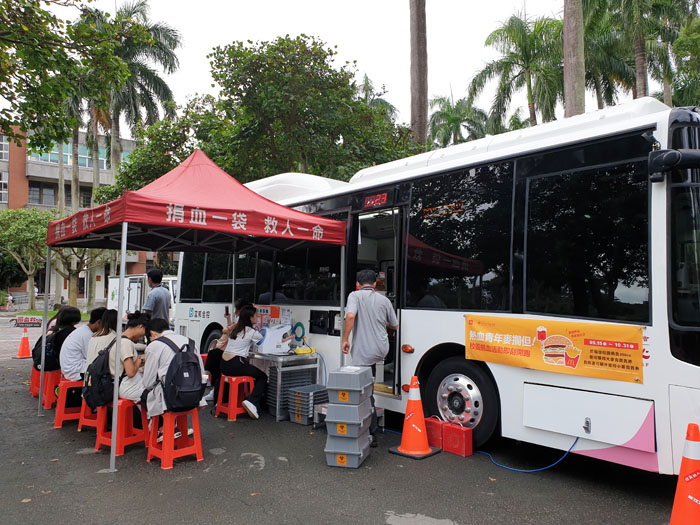
NTU encourages its passionate youth to donate blood—ensuring they live healthy, balanced lives, feel gratitude for campus resources, and participate in acts of service. (Photo courtesy of NTU Health Center)
Gaining Mastery over Daily Life: The “8 AM Class” Standard
“‘Live Well’ is a simple yet profound mantra,” Prof. Chu shared, quoting a friend’s jest: “To test whether a student has control over their life, schedule a class at 8 AM (the so-called ‘early eight’—a major challenge for night-owl students).” If they can’t make it to an 8 AM class, it suggests irregular habits or late nights, which can harm physical and mental health; conversely, those with stable routines tend to be more balanced.
He observed that top universities worldwide face the same issue: high-achieving students often struggle to care for themselves. In fierce competition, encountering more accomplished peers can erode confidence. “I sincerely hope students shift from comparing themselves to others toward solving problems—‘compete with challenges, not with people.’”
Reviving the Blood Drive: NTU’s Faculty and Students Rally Enthusiastically
Thanks to the Student Affairs Office’s guidance, the blood drive returned smoothly to campus. Yet initial negotiations stumbled over which department should coordinate. “When the Blood Center asked if we could reinstate the bloodmobile on campus, the request kept bouncing around,” recalled Dr. Chi An-hsuan of the Health Center. “I thought it was meaningful and took on the task. My supervisor then suggested we move from simply hosting to full collaboration, which allows us to make a greater impact.”
Now, the electric bloodmobiles “Fubon號” and “Rotary Hope號” alternate between the intersection of Palm Avenue and Little Palm Avenue on NTU’s main campus, where students voluntarily check their blood pressure and queue up to donate. Fourth-year medical student Wang Shao-yu said donating blood has become a habit and is a gratifying way to help others—especially during shortages, when the need is urgent. Having the bloodmobile on campus is convenient, eliminating the need to travel elsewhere.
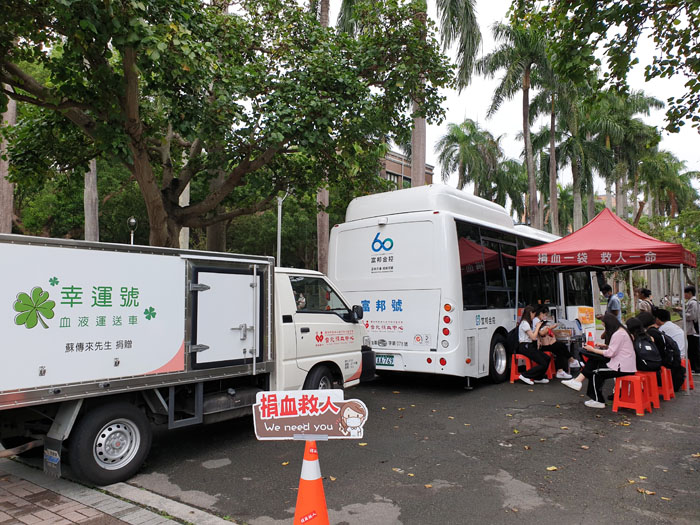
The bloodmobile’s return to campus drew enthusiastic support from NTU’s faculty and students. (Photo courtesy of NTU Health Center)
High Altruistic Awareness, Campus Resources as a Catalyst
“I started donating blood in high school and know it boosts metabolism,” said first-year Civil Engineering student Huang Jo-hsin. “Now, whenever I want to donate, I come.” Peers accompanying her regretted they’d recently returned from abroad and must wait 28 days before donating. “I’ve never donated before, but I really want to try!” The revived campus drive and active participation have subtly encouraged first-time donors.
Promotion is key to increasing willingness. NTU’s success stems from full support and publicity by the university. A third-year Social Work student confirmed she joined after seeing the announcement on NTU’s student forum.
Dr. Chi vividly recalls the challenge of promotion and knows the strategy well, outlining four channels: first, sending a campus-wide email—including faculty and staff—twice yearly to preview upcoming blood drives; second, announcements on the Student Affairs Office website; third, posts on the office’s Instagram; and fourth, biannual posts on NTU’s official Facebook page. Two to three days before each drive, the doctor also posts on the student forum, noting the date and sharing blood-related tips.
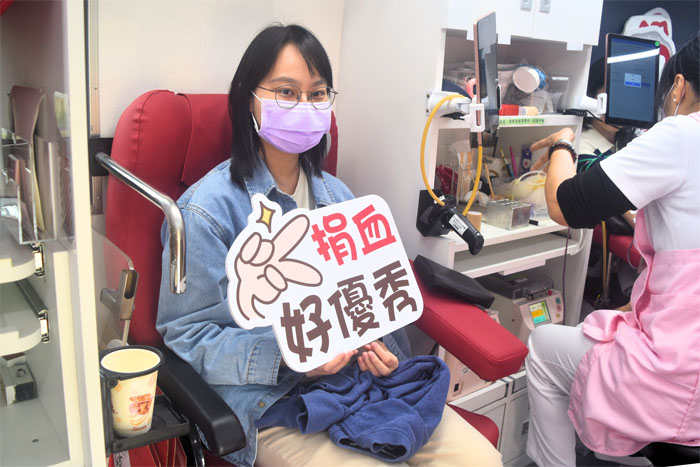
A third-year student says she responded after seeing the blood-drive announcement on NTU’s student forum.
Sharing Results to Amplify Social Impact
“Blood donation differs from hospital blood tests—it doesn’t require fasting and can be done anytime,” said Dr. Chi. He and Dean Chu both propose publishing donation results on NTU’s official Facebook page to showcase collective achievements and motivate more participation, extending the “Live Well, Give Back” ethos.
Some students suggested relocating the bloodmobile to higher-traffic areas. Dean Chu agreed to test different spots for maximum impact. Dr. Chi admitted the electric vehicle’s weight limits location choices—heavy bloodmobiles can damage pavement, and placing them too far off reduces traffic. The current site, a durable asphalt surface near campus center, represents a compromise.
Weather and Location: Tackling the Second Challenge
Weather emerged as the second major challenge. Since the collaboration began, Dr. Chi has recorded attendance, special conditions, and weather each time—discovering that cold temperatures reduce turnout and rain even more so. During a typhoon that felled many trees on campus, debris piled up where the bloodmobile usually parked, forcing relocation and a sharp drop in donors.
Thanks to the efforts of the Health Center, Student Affairs Office, and campus community, the blood drive has achieved strong results. Yet the university seeks to expand further to help remedy blood shortages. Major trauma cases can consume the equivalent of an entire blood drive’s worth of donations at once, so aggressive recruitment is needed. To that end, Dr. Chi plans to bolster education efforts, invite speakers, and share success stories to humanize the donation process.
Growing Alongside Blood Donation: Silent Generational Legacy
Blood donation is a long-term social movement, and NTU, as a leader in Taiwan’s education system, stands at the forefront of public welfare. In 1975 (Minguo Year 64), NTU initiated on-campus blood donations; in 1988 (Minguo Year 77), the Taipei Blood Center stationed the “NTU號” at the main gate; in 2002 (Minguo Year 91), it moved to the side gate on Xinsheng South Road. Generations of NTU alumni have grown up alongside these campus blood drives.
On January 31, 2016, the bloodmobile left campus for pedestrian enhancements on Xinsheng South Road, but student clubs and the Blood Center continued co-hosting drives at various campus locations. In 2023 (Minguo Year 112), the Blood Center proposed monthly on-campus drives; seeing enthusiastic response, they expanded to two consecutive days per session, demonstrating NTU’s positive support for public welfare through action.
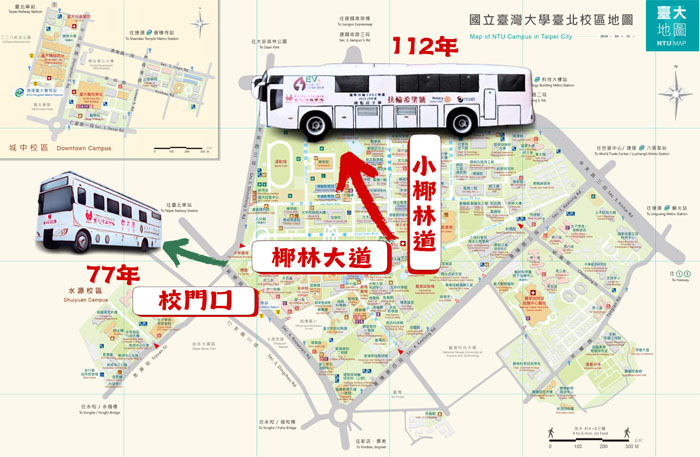
Where once the “NTU號” stood at the main gate in 1988 (Minguo Year 77), since 2023 (Minguo Year 112) the “Fubon號” and “Rotary Hope號” now alternate twice monthly at the Palm Avenue–Little Palm Avenue intersection, with future expansion planned. (Illustration)
Fostering Altruism: Proving Young People’s Passion Endures
“A decline in youth donation rates doesn’t mean young people lack public-service passion,” Dr. Chi affirmed. “If you ask a non-donating student why, they might say they’re too busy studying or feel unwell, so we guide them toward a healthier lifestyle. With good health comes a natural affinity for altruism—no incentives or rewards needed.”
In the 2024 academic year, NTU held 25 on-campus blood drives, attracting 1,235 participants and collecting 1,557 bags of blood, including undergraduate and graduate students, international students, and faculty/staff.
In 1974 (Minguo Year 63), when the Taipei Blood Center was newly established to promote the concept of unpaid blood donation, a group of enthusiastic NTU faculty and students organized the first on-campus blood drive in January of the following year, held at the Student Activity Center. In 1988 (Minguo Year 77), the bloodmobile “NTU號” was stationed at the entrance on Xinsheng South Road, remaining there until 2016 (Minguo Year 105), when it was relocated to accommodate the city’s “2016 Design Capital Project.” Amid declining donation rates among young people and recurring blood shortages, once the Blood Center expressed renewed need, NTU’s passionate faculty and staff stepped forward again—inviting the bloodmobile back onto campus, and in the 2024 academic year (Minguo Year 113) achieving a total of 1,557 bags donated, earning recognition from the Ministry of Education.

Dean of Student Affairs Prof. Chu Shih-wei (left 2) and Health Center physician Dr. Chi An-hsuan (left 3) tirelessly promote the cause of blood donation.
Blood Donation Is More Than an Event—it’s About Living Well
“We kept asking ourselves, ‘What do we really want to give our students?’” said Prof. Chu Shih-wei, who took office as NTU’s Dean of Student Affairs two years ago. He reflected on what could create lasting impact and value for students, distilling his observations over two months into two guiding principles: “Live Well” and “Gratitude in Helping Others.” The first urges students to care for themselves; the second, to give back to society with gratitude. These maxims now appear prominently on the Student Affairs Office website, and three calligraphic works reading “Sleep Well,” “Eat Well,” and “Live Well,” gifted by students, hang in his office as daily reminders.
Are NTU students inherently more responsible or mission-driven than others? “Everyone has a responsibility to society—not just NTU students,” Prof. Chu replied. “But I believe they will become influential leaders; if they learn to give back with gratitude, that will benefit society as a whole.”
He explains that the foundation for helping others is living well, and only with physical and mental health can one donate blood and do good deeds—it’s a virtuous cycle. “Blood donation is a way to help others while enriching your own life, because it’s rooted in altruism.” Reflecting on his own thirty years of teaching and learning at NTU, he noted that blood donation has become part of his life; his wife donates as well, and recently received a commendation for donating twenty units.

NTU encourages its passionate youth to donate blood—ensuring they live healthy, balanced lives, feel gratitude for campus resources, and participate in acts of service. (Photo courtesy of NTU Health Center)
Gaining Mastery over Daily Life: The “8 AM Class” Standard
“‘Live Well’ is a simple yet profound mantra,” Prof. Chu shared, quoting a friend’s jest: “To test whether a student has control over their life, schedule a class at 8 AM (the so-called ‘early eight’—a major challenge for night-owl students).” If they can’t make it to an 8 AM class, it suggests irregular habits or late nights, which can harm physical and mental health; conversely, those with stable routines tend to be more balanced.
He observed that top universities worldwide face the same issue: high-achieving students often struggle to care for themselves. In fierce competition, encountering more accomplished peers can erode confidence. “I sincerely hope students shift from comparing themselves to others toward solving problems—‘compete with challenges, not with people.’”
Reviving the Blood Drive: NTU’s Faculty and Students Rally Enthusiastically
Thanks to the Student Affairs Office’s guidance, the blood drive returned smoothly to campus. Yet initial negotiations stumbled over which department should coordinate. “When the Blood Center asked if we could reinstate the bloodmobile on campus, the request kept bouncing around,” recalled Dr. Chi An-hsuan of the Health Center. “I thought it was meaningful and took on the task. My supervisor then suggested we move from simply hosting to full collaboration, which allows us to make a greater impact.”
Now, the electric bloodmobiles “Fubon號” and “Rotary Hope號” alternate between the intersection of Palm Avenue and Little Palm Avenue on NTU’s main campus, where students voluntarily check their blood pressure and queue up to donate. Fourth-year medical student Wang Shao-yu said donating blood has become a habit and is a gratifying way to help others—especially during shortages, when the need is urgent. Having the bloodmobile on campus is convenient, eliminating the need to travel elsewhere.

The bloodmobile’s return to campus drew enthusiastic support from NTU’s faculty and students. (Photo courtesy of NTU Health Center)
High Altruistic Awareness, Campus Resources as a Catalyst
“I started donating blood in high school and know it boosts metabolism,” said first-year Civil Engineering student Huang Jo-hsin. “Now, whenever I want to donate, I come.” Peers accompanying her regretted they’d recently returned from abroad and must wait 28 days before donating. “I’ve never donated before, but I really want to try!” The revived campus drive and active participation have subtly encouraged first-time donors.
Promotion is key to increasing willingness. NTU’s success stems from full support and publicity by the university. A third-year Social Work student confirmed she joined after seeing the announcement on NTU’s student forum.
Dr. Chi vividly recalls the challenge of promotion and knows the strategy well, outlining four channels: first, sending a campus-wide email—including faculty and staff—twice yearly to preview upcoming blood drives; second, announcements on the Student Affairs Office website; third, posts on the office’s Instagram; and fourth, biannual posts on NTU’s official Facebook page. Two to three days before each drive, the doctor also posts on the student forum, noting the date and sharing blood-related tips.

A third-year student says she responded after seeing the blood-drive announcement on NTU’s student forum.
Sharing Results to Amplify Social Impact
“Blood donation differs from hospital blood tests—it doesn’t require fasting and can be done anytime,” said Dr. Chi. He and Dean Chu both propose publishing donation results on NTU’s official Facebook page to showcase collective achievements and motivate more participation, extending the “Live Well, Give Back” ethos.
Some students suggested relocating the bloodmobile to higher-traffic areas. Dean Chu agreed to test different spots for maximum impact. Dr. Chi admitted the electric vehicle’s weight limits location choices—heavy bloodmobiles can damage pavement, and placing them too far off reduces traffic. The current site, a durable asphalt surface near campus center, represents a compromise.
Weather and Location: Tackling the Second Challenge
Weather emerged as the second major challenge. Since the collaboration began, Dr. Chi has recorded attendance, special conditions, and weather each time—discovering that cold temperatures reduce turnout and rain even more so. During a typhoon that felled many trees on campus, debris piled up where the bloodmobile usually parked, forcing relocation and a sharp drop in donors.
Thanks to the efforts of the Health Center, Student Affairs Office, and campus community, the blood drive has achieved strong results. Yet the university seeks to expand further to help remedy blood shortages. Major trauma cases can consume the equivalent of an entire blood drive’s worth of donations at once, so aggressive recruitment is needed. To that end, Dr. Chi plans to bolster education efforts, invite speakers, and share success stories to humanize the donation process.
Growing Alongside Blood Donation: Silent Generational Legacy
Blood donation is a long-term social movement, and NTU, as a leader in Taiwan’s education system, stands at the forefront of public welfare. In 1975 (Minguo Year 64), NTU initiated on-campus blood donations; in 1988 (Minguo Year 77), the Taipei Blood Center stationed the “NTU號” at the main gate; in 2002 (Minguo Year 91), it moved to the side gate on Xinsheng South Road. Generations of NTU alumni have grown up alongside these campus blood drives.
On January 31, 2016, the bloodmobile left campus for pedestrian enhancements on Xinsheng South Road, but student clubs and the Blood Center continued co-hosting drives at various campus locations. In 2023 (Minguo Year 112), the Blood Center proposed monthly on-campus drives; seeing enthusiastic response, they expanded to two consecutive days per session, demonstrating NTU’s positive support for public welfare through action.

Where once the “NTU號” stood at the main gate in 1988 (Minguo Year 77), since 2023 (Minguo Year 112) the “Fubon號” and “Rotary Hope號” now alternate twice monthly at the Palm Avenue–Little Palm Avenue intersection, with future expansion planned. (Illustration)
Fostering Altruism: Proving Young People’s Passion Endures
“A decline in youth donation rates doesn’t mean young people lack public-service passion,” Dr. Chi affirmed. “If you ask a non-donating student why, they might say they’re too busy studying or feel unwell, so we guide them toward a healthier lifestyle. With good health comes a natural affinity for altruism—no incentives or rewards needed.”
In the 2024 academic year, NTU held 25 on-campus blood drives, attracting 1,235 participants and collecting 1,557 bags of blood, including undergraduate and graduate students, international students, and faculty/staff.
Share on
-
Copied to clipboard
Latest News
2025.08.22
